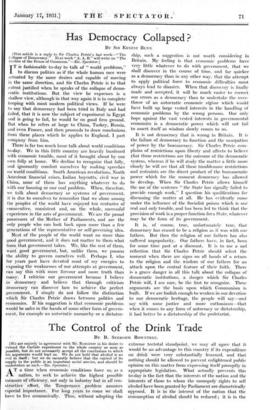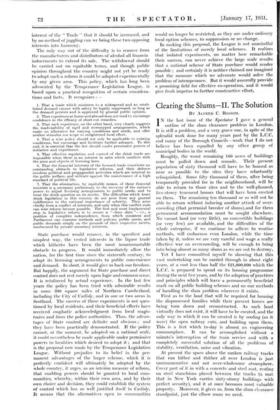The Control of the Drink Trade
BY B. SEEBOIIM ROWNTREE.
[We are entirely in agreement with Mr. Rowntree in his desire to cxtend the Carlisle experiment to the whole country as soon as possible, but do not necessarily accept all the conclusions to which his arguments would load us. We do not hold that alcohol is an ocil in itself ; but we do earnestly believe that the control of its supply to the public is an important social service, and should be undertaken as such—En. Spectator.] • jiLk.T a time when economic conditions force us, as a nation, to seek to aehiei,e the highest possible measure of efficiency, not only in industry but hi all 'con- . structive effort, the Temperance problem assumes especial importance. For long years to come we shall have to live economically. Thus, without adopting the extreme teetotal standpoint, we may all agree that it would be an advantage to this country if its expenditure on drink were very substantially lessened, and that nothing should be allowed to prevent enlightened public opinion on this matter from expressing itself promptly in appropriate legislation. What actually prevents this to-day is the fact that the interests of the nation and the interests of those to whom the monopoly rights to sell alcohol have been granted by Parliament are diametrically opposed. -It is in- the interest of the nation that the consumption of alcohol shoal be reduced ; it is in the interest of the " Trade " that it should be increased, and by no method of juggling can we bring these two opposing interests into harmony.
The only way out of the difficulty is to remove from the manufacturers and distributors of alcohol all financia inducements to extend its sale. The withdrawal should be carried out on equitable terms, and though public opinion throughout the country might not yet be ready to adopt such a reform it could be adopted experimentally by any given area. This policy, which has long. been advocated by the Temperance Legislation League, is based upon a practical recognition of certain considera- tions and facts. It recognizes :-
1. That a trade which ministers to a widespread and an estab- lished demand cannot with safety be legally suppressed, so long as the demand persists and is approved by general public opinion.
2. That experience at home and abroad does not tend to encourage confidence in the efficacy of short-cut remedies.
3. That such experience, on the other hand, very clearly suggests the inadvisability of rigid and stereotyped arrangements, which make no allowance for varying conditions and needs, and offer neither stimulus nor scope to enlightened local effort.
4. That a wise policy should not only be applicable to existing conditions, but encourage and facilitate further advance. To this end, it is essential that the law should confer permissive powers of initiative and experiment.
5. That effective regulation and control of the drink trade are impossible when there is an interest in sales which conflicts With the aims and objects of licensing laws.
6. That the financial interests of the licensed trade constitute an outstanding obstacle to legislative reforms, and their defence involves political and propagandist activities which are inimical to the public welfare, and militate against the maintenance of a high standard of political life.
7. That the elimination, by equitable means, of these financial interests is a necessary preliminary to the recovery of the nation's power to adjust licensing arrangements to public needs, and to treat the drink question on its merits. The difficulties which beset drink legislation in this country do not arise from any general indifference to the national importance of sobriety. They arise chiefly from a conflict of interests, and only when this conflict ends can wise reform become possible. The first and most fundamental step in legislative reform is to secure a "clean slate "—i.e., a position of complete independence, from which ministers and Parliament can examine methods and policies, public needs, and public demands simply on the grounds of their respective merits, nnobscured by private monetary interests.
State purchase would remove, in the speediest and simplest way, the vested interests in the liquor trade which hitherto have been the most insurmountable obstacle to progress. It would immediately allow the nation, for the first time since the sixteenth century, to adapt its licensing arrangements to public convenience and demand. In short, it would give us back our freedom. But happily, the argument for State purchase and direct control does not rest merely upon logic and common sense. It is reinforced by actual experience. In the last few years the policy has been tried with admirable results in some 330 square miles of Northern Cumberland, including the City of Carlisle, and in one or two areas in Scotland. The success of those experiments is not ques- tioned by local residents, and their beneficial effects have received emphatic acknowledgment from local magis- trates and from the police authorities. Thus, the advan- tages of State control are definite and obvious ; and they have been practically demonstrated. If the policy cannot, at the moment, be adopted on a national scale, it could nevertheless be made applicable under permissive powers to localities which desired to adopt it ; and that is the proposal now made by the Temperance Legislation League. Without prejudice to its belief in the per- manent advantages of the larger scheme, which it is perfectly confident will ultimately be adopted by the whole country, it urges, as an interim measure of reform, that enabling powers should be granted to local com- munities, whereby, within their own area, and by their own choice and decision, they could establish the system of control which has so well justified itself in Carlisle. It means that the alternatives open to communities would no longer be restricted, as they are under ordinary local option schemes, to suppression or no change.
In making this proposal, the League is not unmindful of the limitations of merely local schemes. It realizes that isolated experiments, no matter how remarkable their success, can never achieve the large scale results that a national scheme of State purchase would render possible ; and certainly it is neither claimed nor imagined that the measure which we advocate would solve the problem of intemperance. But it would assuredly provide a promising field for effective co-operation, and it would give fresh impetus to further constructive effort.





































 Previous page
Previous page